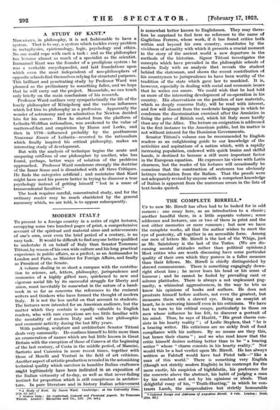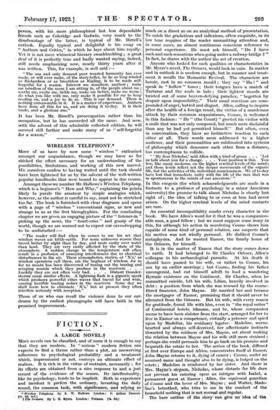THE COMPLETE BIRRELL.* Up to now Mr. Birrell has often
had to be looked for in odd corners : one essay here, as an introduction to a classic ; another handful there, in a little separate volume ; some addresses and lectures, one or two of them in print and the rest either memories or mere rumours ; but now we have the complete works, all that the author wishes to meet the eye of posterity, all together in an accessible form. Among our men of letters Mr. Birrell is the last of the Whigs, just as Mr. Saintsbury is the last of the Tories. (We are dis- cussing mental attitudes rather than political opinions.) Most critics who are worth discussing have some particular quality of their own which they possess in a fuller measure than their fellows. Mr. Birrell is chiefly distinguished by shrewd commonsense. There is something engagingly down- right about him ; he never loses his head or his sense of humour ; and he cannot be fooled by prevailing cant or solemn platitudes. There is always a not unpleasant pug- nacity, a whimsical aggressiveness, in the way he lets us know his opinions of books and authors. He does not prostrate himself before authors, not even the greatest, but measures them with a shrewd eye. Being an essayist at heart, he is mirroring himself even in his criticisms. We have but to turn to his critical essays, particularly to those on men whose influence he has felt, to discover a portrait of his mind. Thus, he says of Hazlitt, " His great charm con- sists in his hearty reality " ; of Leslie Stephen, that " he is a bracing writer. His criticisms are no sickly fruit of fond compliance with his authors. By no means are they this, but hence their charm " ; and we who read know that the critic himself desires nothing better than to be " a bracing writer " whose " charm consists in his hearty reality." Nor would this be a bad verdict upon Mr. Birrell. He. has always written as Falstaff would have had Pistol talk—" like a man of this world." There is something very English (though not strictly modern English) in his contempt for the mere exotic, his suspicion of highfalutin, his preference for the concrete above the abstract, his habit of judging a man by his conduct and not by his opinions or. ideals. That delightful' essay of his, " Truth-Hunthig," in which he con- trasts Lamb, the unspeculative _ but strictly honourable ••Colkded Buoys cad Addresses of Augustine Bissell. 3 vols. London : Dent.
131e. &LI .
person, with his more philosophical but less dependable friends such as Coleridge and Godwin, very much to the disadvantage of the latter, is typical of Mr. Birrell's outlook. Equally typical and delightful is his essay on " Authors and Critics," in which he lays about him royally.
Yet it is not mere whimsical literary swashbuckling ; a great deal of it is perfectly true and badly wanted saying, indeed, still needs emphasizing now, nearly thirty years after it was written. This, for example, is well said :-
" The one and only demand poor wearied humanity has ever made, or will ever make, of the story-teller, be he as long-winded as Richardson or as breathless as ICipling, is to be made self- forgetful for a season. Interest me somehow, anyhow • make me mindless of the room I am sitting in, of the people about me ; soothe me, excite me, tickle me, make me better, make me worse ; do what you like with me, only make it possible for me to keep reading on, and a joy to do so. This is our demand. There is nothing unreasonable in it. It is a matter of experience. Authors have done all this for us, and are doing it to-day. It is their trade, and a glorious one."
It has been Mr. Birrell's preoccupation rather than his occupation, but he has succeeded all the same. And now, with the advent of this admirable collected edition, he will succeed still further and make many of us " self-forgetful
for a season."











































 Previous page
Previous page